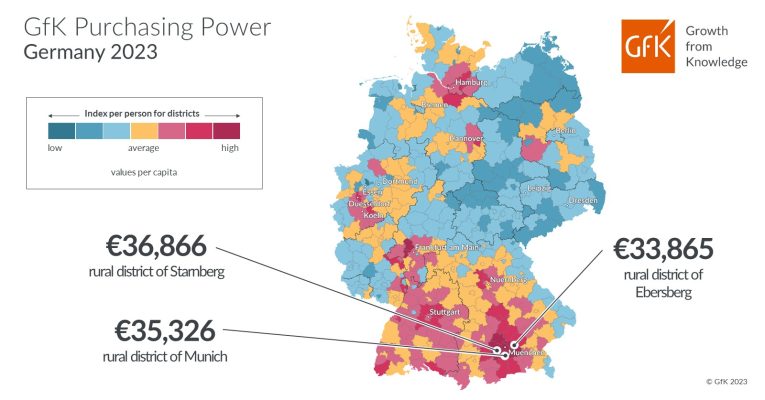Cost of Living in Germany – Updated for 2024
If you’re in a pricier city or tend to splurge on non-essentials, your expenses will be higher.
As you read further, you’ll discover more about the costs of university education, food, accommodation, and other essential expenses in different German cities. You will also find a comparison of German prices versus the US and India
Which Region Has the Highest Cost of Living in Germany?

The South of Germany Is the Most Expensive: Munich & Stuttgart
In general, the south of Germany is the most expensive area to live in Germany. Two of the largest cities in this part of the country, Munich and Stuttgart, are some of the most expensive cities to live in.
For example, renting a one-bedroom apartment in Stuttgart costs €1,023 on average, while a similar apartment in the northern German city, Bremen, costs €687 on average.
In percentage terms, this means that renting an apartment in Bremen is cheaper than in Stuttgart by over 30%.
Berlin Remains More Affordable Than Other European Capitals
The German capital, Berlin, has become more expensive as the city attracts a growing number of residents, including foreigners. The average cost of renting a small one-bedroom apartment in Berlin is now around €1,321 per month.
Despite this increase, Berlin remains more affordable than many other major European capitals, with rent prices approximately 11.9% lower than in Paris, 47.7% lower than in London, and 20.0% lower than in Amsterdam.
Leipzig and Dresden Among the Most Affordable in Germany
Other cities around Berlin in the east of Germany are mainly cheaper than their counterparts in the south. Leipzig and Dresden some of the most affordable cities to live in Germany.
Renting in Leipzig is cheaper than in Stuttgart by over 33%, in Dusseldorf cheaper by 33.3% than in Stuttgart, whereas prices in Stuttgart and in the biggest city in the North, Hamburg are pretty similar.
The Priciest Cities Within Each Zone: A Comparison
To arrange them in order from most expensive to least expensive, let’s consider some expenses in the priciest cities within each zone:
| Munich | Berlin | Hamburg | Frankfurt | |
| Rent | €1,397.71 | €1,317.19 | €996.18 | €1,156.17 |
| White bread (500g) | €2.23 | €1.94 | €2.02 | €1.91 |
| Restaurant meal | €15.00 | €12.00 | €15.00 | €14.50 |
| Milk (1 liter) | €1.24 | €1.24 | €1.23 | €1.16 |
| Eggs (12) | €3.23 | €3.27 | €3.41 | €3.22 |
| Rice (1kg, white) | €2.60 | €2.80 | €2.68 | €2.42 |
| Tomato (1kg) | €2.61 | €2.95 | €2.71 | €2.21 |
| Potato (1kg) | €1.81 | €1.64 | €1.69 | €1.42 |
| Beer (0.5liter) | €0.99 | €0.96 | €0.98 | €0.95 |
| Taxi 1km | €2.27 | €2.00 | €2.50 | €2.00 |
Overall, based on these categories, Munich is the most expensive city in multiple categories, followed by Berlin, Hamburg, and Frankfurt.
However, rent constitutes the most substantial expense, with Frankfurt having higher rent costs compared to Hamburg.
In terms of major expenses, with rent being the primary factor, the order from most expensive to least expensive among the big cities is as follows:
- South
- East
- West
- North
But, Each Region Has Its Affordable Options…
This ranking considers some of the pricier cities in Germany, but it’s important to remember that each region also has its fair share of budget-friendly options.
- For instance, in western Germany, the city of Paderborn stands out for offering a more affordable cost of living, with rent prices in Paderborn being 44.4% lower than those in Frankfurt.
- Moving to the east, Dresden is renowned for its cost-effectiveness, boasting rent prices that are 50.4% lower than Berlin.
- Down south, Ingolstadt offers reasonable costs, especially when compared to the significantly more expensive Munich, where rent prices are 40.6% higher.
- Heading north, Bremen offers affordability, with rent prices 34.9% lower than Hamburg’s.
Germany caters to diverse budgets and preferences, ensuring accessibility for students and residents alike.
What Is the Average Rent in Germany?
The average rent ranges from €567 per month in cities like Aachen and Paderborn to €1,398 in Munich. So, considering the cities mentioned in the table below, the average rent in Germany is around €827 per month.
Labeling a particular city as an expensive place to live in is done mostly because of the rent costs because that’s the largest expense you will have in Germany.
In terms of cost discrepancies between cities, big cities like Munich, Berlin, Hamburg, and Frankfurt are mainly more expensive than other cities like Aachen or Dresden.
For instance, if you’re eyeing a one-bedroom apartment in the heart of the city, monthly rent can vary from €520 to €1,500. If you’re in the market for a spacious, fully furnished apartment near the city center, expect to pay anywhere from €1,000 to €2,500 per month.
On the flip side, if you’re open to living in the suburbs, a similar one-bedroom apartment might cost you around €400 to €1,130 per month.
The table below shows the average monthly cost of rent in some German cities, including the biggest ones (from cheapest to most expensive):
| City | Average Monthly Rent |
| Aachen | €567 |
| Paderborn | €567 |
| Bochum | €600 |
| Dresden | €622 |
| Dortmund | €624 |
| Leipzig | €636 |
| Bremen | €687 |
| Mannheim | €693 |
| Bonn | €712 |
| Hanover | €728 |
| Ingolstadt | €732 |
| Essen | €740 |
| Karlsruhe | €744 |
| Nuremberg | €760 |
| Augsburg | €780 |
| Mainz | €863 |
| Cologne | €929 |
| Dusseldorf | €970 |
| Hamburg | €996 |
| Heidelberg | €996 |
| Stuttgart | €1,023 |
| Frankfurt | €1,156 |
| Berlin | €1,321 |
| Munich | €1,398 |
Important note: The above rental prices are given for a one-bedroom apartment located in the center of the city.
How Much Does Dining Out Cost in Germany?
Dining out at German restaurants can be pricey. A meal for two people at mid-range spots like Bavarian beer gardens or Italian joints may cost you an average of €60. So, if your cooking skills aren’t up to par, it’s time to start learning, especially if you’re looking to save money in Germany.
However, Germany’s dining scene has something for everyone’s wallet. If you’re keeping it cheap, think doner kebabs – you can fill up for €12 on average. Followed by any casual dessert or any drink, the price will climb higher. For example, half a liter of German domestic beer costs around €4, as opposed to an imported beer which costs €3.55.
If you choose to have a cappuccino instead of a beer, you’ll have to pay around €3.22. A 0.33-liter bottle of water costs about €2.37, and a soda costs around €2.66.
How Much Do Groceries Cost in Germany?

While the occasional restaurant meal can be a nice treat, there are more budget-friendly options if you’re watching your finances.
If you like cooking at home or you muster the confidence to pick up a few basic cooking skills, this will be a great way to save money. The prices of essential food and drinks in Germany are quite reasonable compared to the cost of dining out.
Here are the average costs for some of these items:
| Item | Average Cost |
| White bread (500g) | €1.90 |
| Milk (1 liter) | €1.08 |
| Eggs (12) | €3.05 |
| Rice (1kg, white) | €2.46 |
| Potato (1kg) | €1.52 |
| Onion (1kg) | €1.50 |
| Tomato (1kg) | €1.69 |
| Chicken (1kg) | €12.47 |
| Beef (1kg) | €14.93 |
| Apples (1kg) | €2.37 |
| Banana (1kg) | €1.48 |
| Oranges (1kg) | €2.08 |
What Are the Transportation Costs in Germany?
Nowadays, people are constantly on the move – rushing to classes or work, back to your apartment, meeting friends across town, or going shopping. It can get pretty hectic. Making the right transportation choices can save you both time and money.
Depending on the mode of transportation, the cost differs. It’s always helpful to know the options.
Here are some of them:
- For navigating crowded cities, especially during rush hours, nothing beats a bicycle. You can buy one, rent from someone with a payment arrangement, or use Deutsche Bahn’s Call a Bike service if it’s available in your city for about €5.90 per month.
- Public transport. Public transport is another economical option. Currently, an average one-way ticket on local public transport costs around €3.00. If you’re a regular commuter on the same route, a monthly ticket averages around €60.
- When taking a taxi, the starting fare typically averages around €3.60, and the cost per kilometer can vary from €1.80 to €2.80. If you own or plan to own a car, the price of gasoline in Germany currently ranges between €1.74 and €2.20.
- Personal car. According to Statista, 72% of people in Germany own a car. So, if you’re traveling by car, you should know that the average cost of gasoline in Germany is €1.95 per liter. It can range from €1.74 to €2.20 per liter. According to Statista, 72% of people in Germany own a car.
What Are the Typical Expenses for Utilities and Bills in Germany?
Besides housing rent, you will need to cover monthly bills for heating, electricity, water, and garbage. In Germany, these costs are often referred to as “Nebenkosten”
Unfortunately, the price of electricity in Germany is quite high, at approximately €0.4125 per kilowatt-hour (kWh) for households.
Here are the average costs for utilities and additional bills in Germany:
- Utilities (Electricity, Heating, Cooling, Water, Garbage). For an 85m² apartment, you might spend around €272.65 monthly. This includes electricity, heating, cooling, water, and garbage collection. Costs can range from €170.00 to €425.00 depending on factors like apartment size and energy consumption.
- Mobile Phone Plan. A mobile phone plan with calls and 10GB+ data usually costs about €32.19 monthly. Prices can vary based on your chosen plan and provider, ranging from €12.00 to €39.95 per month.
- Internet Connection (60 Mbps or More, Unlimited Data, Cable/ADSL). Expect to budget around €43.18 per month for high-speed internet. Costs may range from €30.00 to €47.95, depending on the provider and plan.
If you live with roommates, you will, of course, share these expenses. In some cases, utilities are calculated in your rent payment (known as “Warmmiete”), so you don’t have to pay any extra.
How Much Does Health Insurance Cost in Germany?
Health insurance costs can vary depending on factors like your age, coverage needs, and the insurance provider you select.
This insurance comes in two main forms: statutory health insurance, known as Gesetzliche Krankenversicherung (GKV), and private health insurance, or Private Krankenversicherung (PKV).
You have the freedom to choose between these plans based on your coverage needs and budget. Public health insurance generally has lower premiums, while private health insurance offers more extensive coverage at a higher cost.
In Germany, health insurance is mandatory by law for everyone, regardless of residence status or income, starting from the first day you arrive in the country.
How Much Does Public Health Insurance Cost?
In Germany, the public healthcare insurance system (GKV, Gesetzliche Krankenversicherung) requires that 14.6% of an employee’s gross salary goes towards health insurance. This amount is equally shared between the employer and employee, with each paying 7.3%.
Public healthcare providers can also add an extra charge of up to 1.7% of the salary, which the employer pays.
Let’s say an employee in Germany earns a gross salary of €3,000 per month. Here’s how the contributions for public healthcare insurance (GKV, Gesetzliche Krankenversicherung) would be calculated:
- Employee’s Contribution. The employee pays 7.3% of their gross salary towards public healthcare insurance (GKV, Gesetzliche Krankenversicherung). For a €3,000 salary, this is 7.3% of €3,000, amounting to €219.
- Employer’s Contribution. The employer also contributes an equal amount to the employee’s healthcare insurance. So, they also pay €219 (7.3% of €3,000).
- Total Social Security Contribution. Adding both contributions together, the total amount contributed to the public healthcare insurance is €438. This is the sum of the employee’s and employer’s contributions (€219 + €219).
How Much Does Private Health Insurance Cost?
The cost of premiums in private health insurance is determined by individual risk evaluations, which take into account factors such as the person’s age, health status, selected coverage options, and overall risk level.
Private health insurance in Germany is mainly designed for individuals with higher incomes, specifically those earning more than €66,600 as of 2023, as well as for self-employed people and civil servants.
> Read our comprehensive guide on health insurance in Germany here.
How Much Does Health Insurance Cost for Students in Germany?
As of 2023, monthly costs for leading public health insurance providers range from €122.77 to €126.02, which includes both health and long-term care insurance contributions.
Students are eligible for statutory health insurance until age 30, after which they can choose private insurance or voluntarily continue with public insurance, often at higher rates but with student discounts.
How Much Does Household Contents Insurance Cost in Germany?
Basic contents insurance policies typically begin at approximately €20 to €25 annually, which means just under €2 per month.
Home contents insurance, known as Hausratversicherung in Germany, generally covers movable personal belongings like furniture, clothing, jewelry, and various types of equipment.
How Much Does Car Insurance Cost in Germany?
In Germany, there are different kinds of car insurance, such as third-party liability, partial coverage, and comprehensive coverage. By law, every car must have third-party liability insurance. Partial and comprehensive coverage provide extra benefits and protection.
Car insurance costs include around €250 per year for mandatory liability insurance, an additional €85 for optional partial coverage, and about €350 extra for comprehensive coverage, depending on what you choose.
What’s the Cost of Higher Education in Germany?
The cost of university education in Germany is affordable, particularly at state-funded institutions. For both domestic and international students, most bachelor’s and the majority of master’s degree programs do not require tuition fees.
However, semester fees are typically applicable, which cost around €100 to €400 per semester. These fees generally encompass administrative costs, student union contributions, and, in some cases, provide access to public transportation.
The exception is the Federal State of Baden-Württemberg, where non-EU citizens pursuing various degree programs are required to pay €1,500 per semester.
The Federal State of Bavaria’s newly updated Bavarian Higher Education Innovation Act (BayHIG) also enables universities to charge tuition fees for international students from third countries from 2023 on.
Tuition fees may apply to programs at private universities or specialized master’s programs at public universities, with costs typically ranging from approximately €3,000 to €20,000 or higher per year, depending on the institution and program.
> More information about the cost of studying in Germany here.
What Are Other Expenses to Consider When in Germany?
In addition to the essential expenses already discussed, there are some other costs you should consider while studying and living in Germany. For instance, you might find the need to update your wardrobe with new clothes or shoes to accommodate different seasons.
Clothing Costs
Germany offers high-quality clothing, but it can come with a higher price tag. Expect to spend around 40 to 110 euros for a pair of jeans, and if you’re looking for shoes, like Nike Running shoes, the price typically ranges from 50 to 120 euros.
For more formal business shoes, you might be looking at a higher cost, between 60 and 170 euros. To save on clothing expenses, you can explore outlet stores or consider buying second-hand items.
Entertainment Costs
When it comes to entertainment, going to the cinema can be fun but can cost you around 10 to 15 euros per seat. Look out for student discounts and special deals to save on movies. You can also enjoy budget-friendly entertainment with student club events and socialize without breaking the bank.
If you’re into fitness, joining a gym costs about €33.82 per month on average.
Cost of Living in Germany vs the US
The cost of living in Germany is cheaper than living in the US. A single person can get by with $1,023 per month in Germany, but they’d need $1,173 in the US without adding rent to the calculation. This means an average person would need 12.7% less money in Germany compared to the US for one month.
Consumer prices (including rent), such as the cost of food and beverages, apparel, recreation, etc, are 26.6% lower in Germany. A one-bedroom apartment in the city center in Germany is 51.4% cheaper than the same one-bedroom apartment in the US.
Interestingly, the cost of utilities and local transportation is slightly higher in Germany.
See the table below for more information:
| Expense | Germany | US | Difference in % |
| Monthly costs (for one person) excluding rent | $1,023 | $1,173 | -12.7% (lower in Germany) |
| Rent (1-bedroom apartment) in the city center | $901.12 | $1,854.15 | -51.4% (lower in Germany) |
| Basic Utilities (electricity, heating, cooling, water, garbage) | $298.14 | $212.77 | +40.1% (higher in Germany) |
| Local Transport (one-way ticket) | $3.27 | $2.50 | +30.9 % (higher in Germany) |
| Meal for 2 (mid-range restaurant) | $65.45 | $75.00 | -12.7% (lower in Germany) |
| Domestic Beer (0.5 liter draught) | $4.36 | $6.00 | -27.3% (lower in Germany) |
| Coffee (Cappuccino) | $3.52 | $4.88 | -27.9% (lower in Germany) |
| Water (1.5 liter bottle from the store) | $0.67 | $2.15 | -69.0% (lower in Germany) |
| Gym | $36.84 | $52.11 | -29.3% (lower in Germany) |
Source: Numbeo
Cost of Living in Germany vs India
The cost of living in Germany is higher compared to India. If a single person needs around ₹27,882.1 in India (excluding rent), the same person will need ₹85,316.5 per month in Germany, which is a 205.9% increase in cost.
Looking at the table below, all items are pricier in Germany. To add an overall estimate, consumer prices, including rent, are 225.0% higher in Germany. A one-bedroom apartment in Germany costs 404.4% more than the same apartment in India.
For a more detailed overview, take a look at the table below:
| Expense | Germany | India | Difference in % |
| Monthly costs (for one person) excluding rent | ₹85,316.5 | ₹27,882.1 | +205.9% (higher in Germany) |
| Rent (1 bedroom apartment) in the city center | ₹75,105.45 | ₹14,888.88 | +404.4% (higher in Germany) |
| Basic Utilities (electricity, heating, cooling, water, garbage) | ₹24,848.59 | ₹3,394.20 | +632.1% (higher in Germany) |
| Local Transport (one-way ticket) | ₹272.74 | ₹30.00 | +809.1% (higher in Germany) |
| Meal for 2 (mid-range restaurant) | ₹5,454.85 | ₹1,000.00 | +445.5% (higher in Germany) |
| Domestic Beer (0.5 liter draught) | ₹363.66 | ₹160.00 | +127.3% (higher in Germany) |
| Coffee (Cappuccino) | ₹293.38 | ₹143.43 | +104.5% (higher in Germany) |
| Water (1.5 liter bottle from the store) | ₹55.61 | ₹29.04 | +91.5 % (higher in Germany) |
| Gym | ₹3,070.37 | ₹1,428.02 | +115.0 % (higher in Germany) |
Source: https://www.studying-in-germany.org/cost-of-living-in-germany/










